人教版(2019)必修二: Unit 4 History and traditions Listening and Speaking 提升一练(含答案)
文档属性
| 名称 | 人教版(2019)必修二: Unit 4 History and traditions Listening and Speaking 提升一练(含答案) | 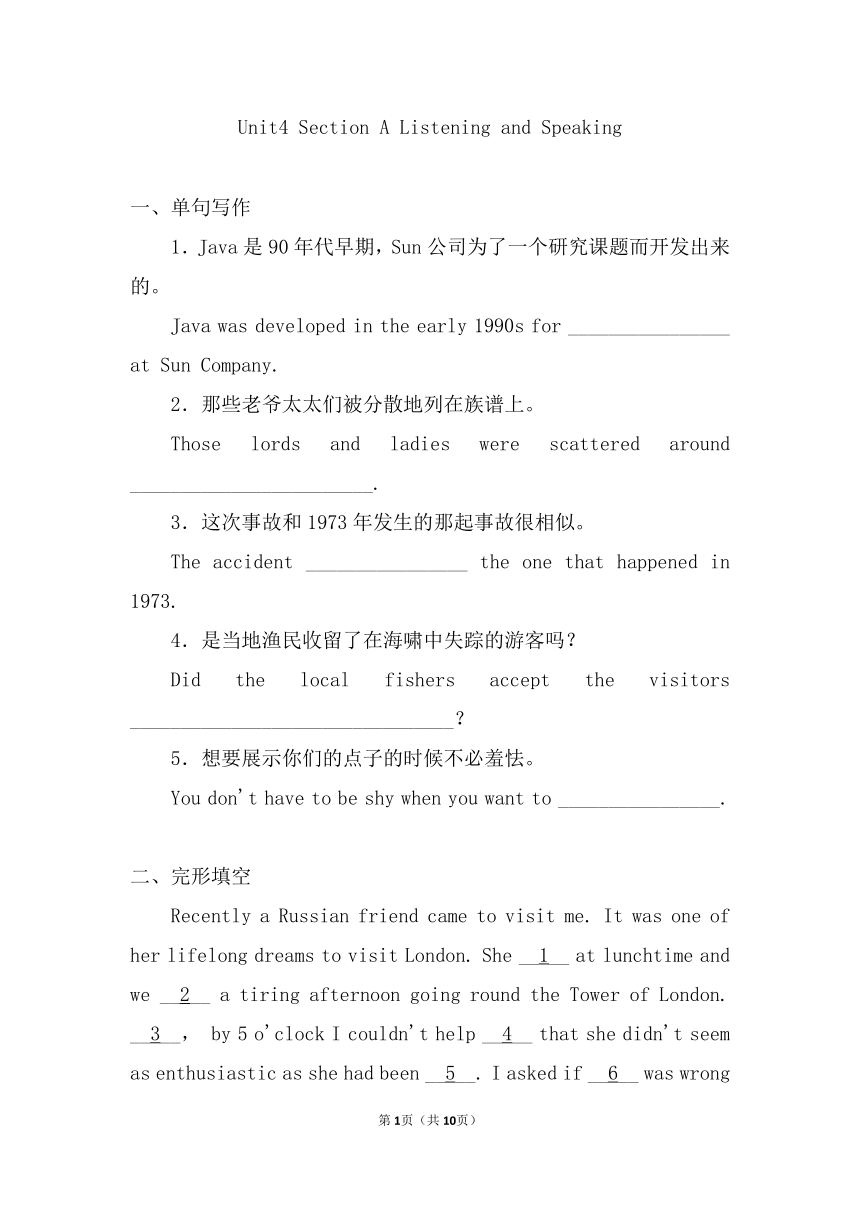 | |
| 格式 | doc | ||
| 文件大小 | 49.5KB | ||
| 资源类型 | 教案 | ||
| 版本资源 | 人教版(2019) | ||
| 科目 | 英语 | ||
| 更新时间 | 2021-11-05 10:13:20 | ||
图片预览

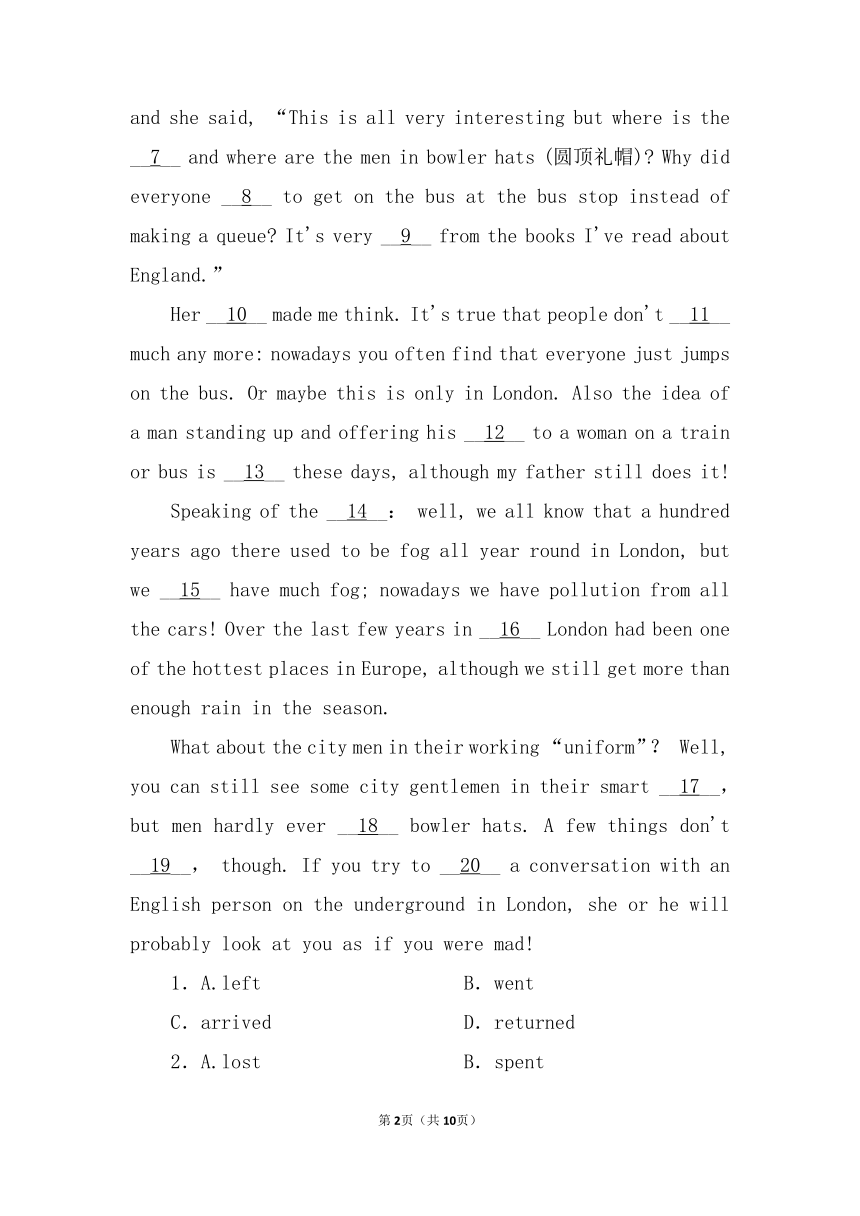
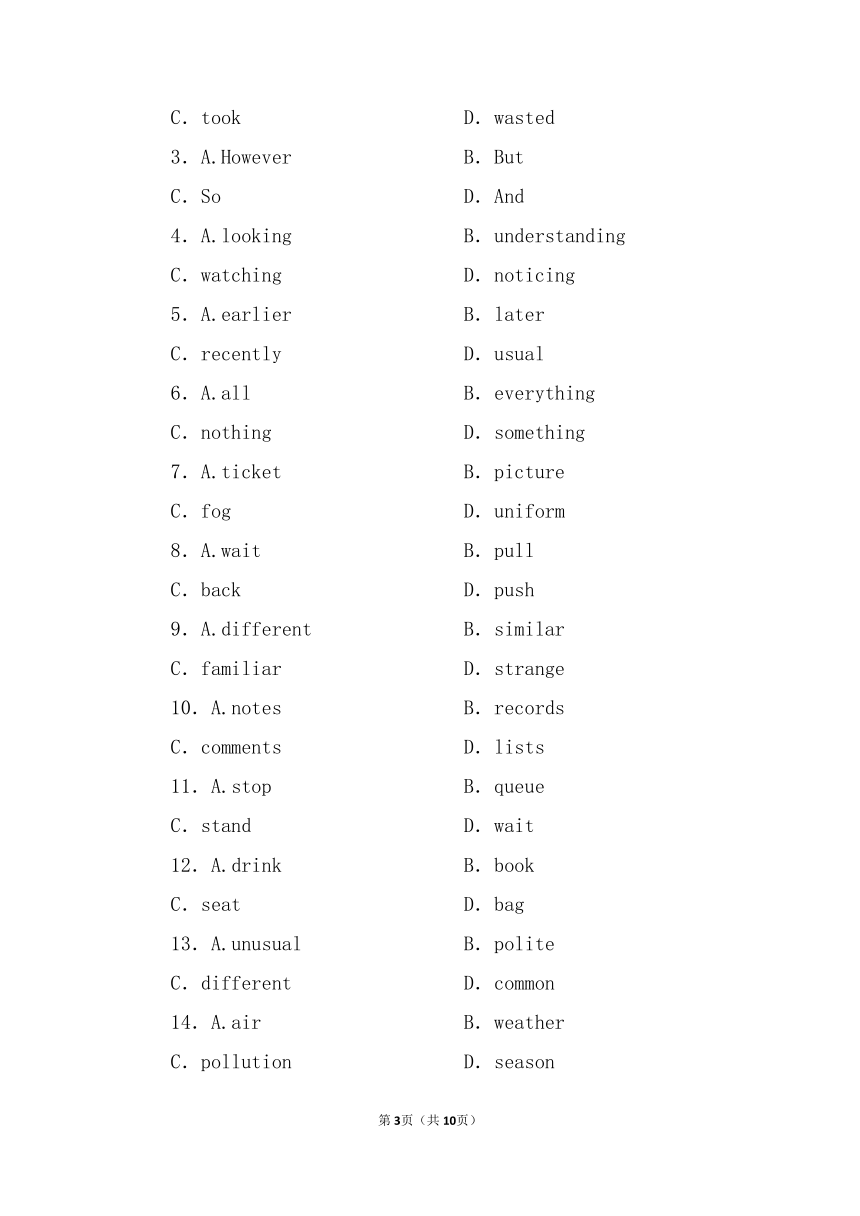
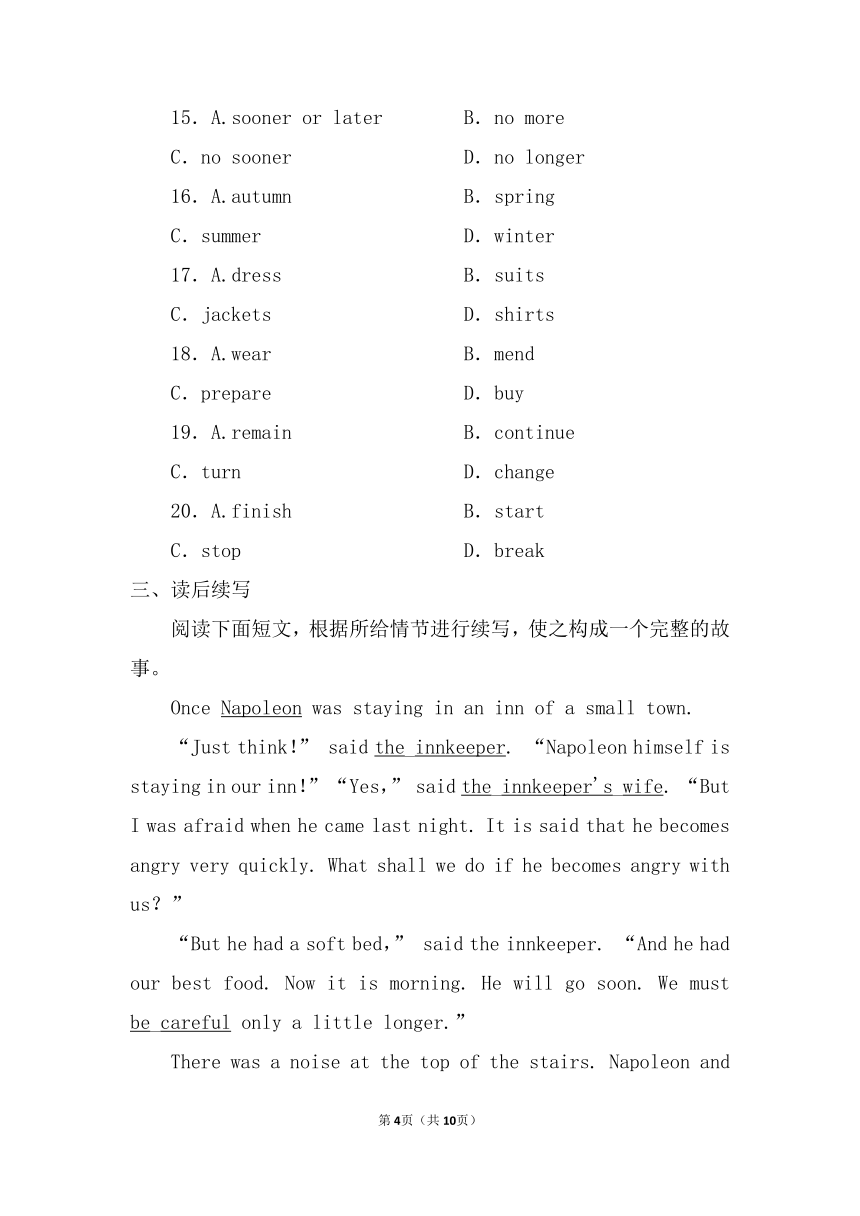
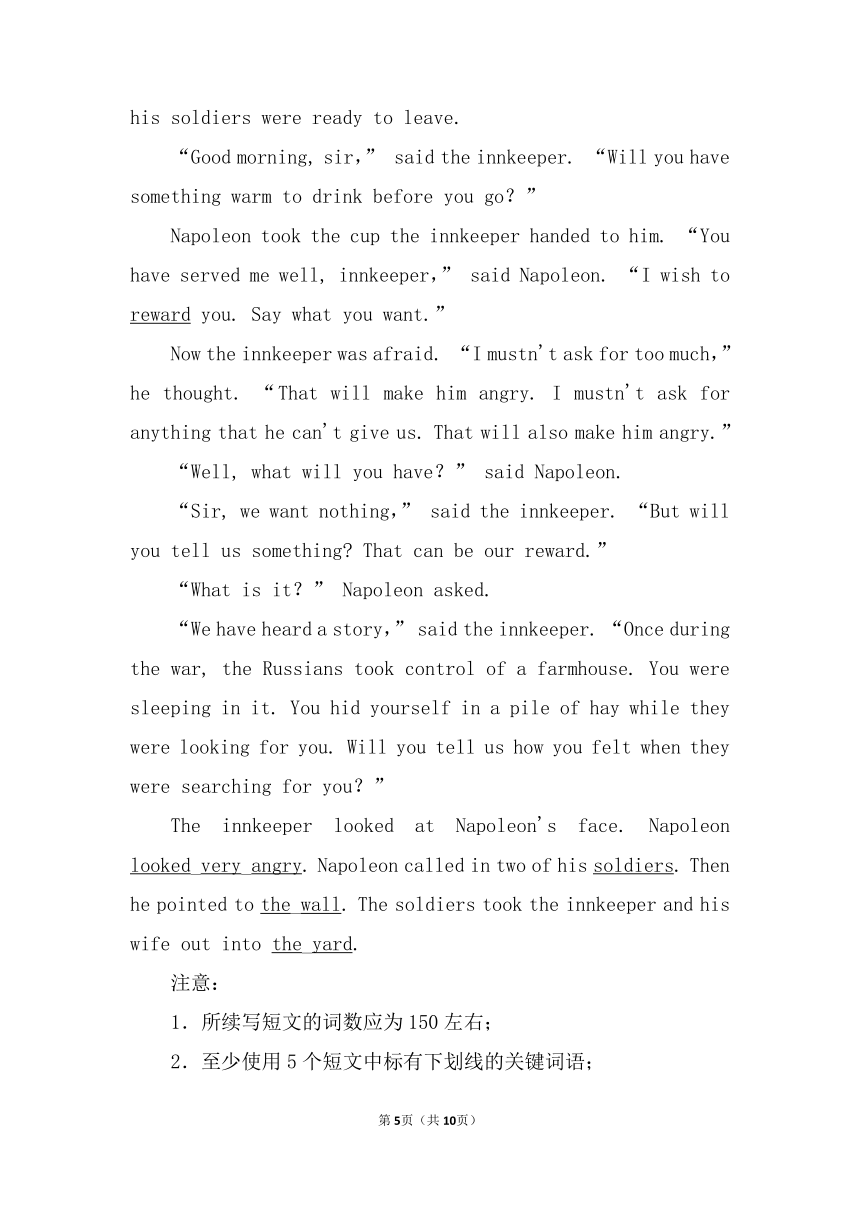
文档简介
Unit4 Section A Listening and Speaking
一、单句写作
1.Java是90年代早期,Sun公司为了一个研究课题而开发出来的。
Java was developed in the early 1990s for ________________ at Sun Company.
2.那些老爷太太们被分散地列在族谱上。
Those lords and ladies were scattered around ________________________.
3.这次事故和1973年发生的那起事故很相似。
The accident ________________ the one that happened in 1973.
4.是当地渔民收留了在海啸中失踪的游客吗?
Did the local fishers accept the visitors ________________________________?
5.想要展示你们的点子的时候不必羞怯。
You don't have to be shy when you want to ________________.
二、完形填空
Recently a Russian friend came to visit me. It was one of her lifelong dreams to visit London. She __1__ at lunchtime and we __2__ a tiring afternoon going round the Tower of London. __3__, by 5 o'clock I couldn't help __4__ that she didn't seem as enthusiastic as she had been __5__. I asked if __6__ was wrong and she said, “This is all very interesting but where is the __7__ and where are the men in bowler hats (圆顶礼帽) Why did everyone __8__ to get on the bus at the bus stop instead of making a queue It's very __9__ from the books I've read about England.”
Her __10__ made me think. It's true that people don't __11__ much any more: nowadays you often find that everyone just jumps on the bus. Or maybe this is only in London. Also the idea of a man standing up and offering his __12__ to a woman on a train or bus is __13__ these days, although my father still does it!
Speaking of the __14__: well, we all know that a hundred years ago there used to be fog all year round in London, but we __15__ have much fog; nowadays we have pollution from all the cars! Over the last few years in __16__ London had been one of the hottest places in Europe, although we still get more than enough rain in the season.
What about the city men in their working “uniform”? Well, you can still see some city gentlemen in their smart __17__, but men hardly ever __18__ bowler hats. A few things don't __19__, though. If you try to __20__ a conversation with an English person on the underground in London, she or he will probably look at you as if you were mad!
1.A.left B.went
C.arrived D.returned
2.A.lost B.spent
C.took D.wasted
3.A.However B.But
C.So D.And
4.A.looking B.understanding
C.watching D.noticing
5.A.earlier B.later
C.recently D.usual
6.A.all B.everything
C.nothing D.something
7.A.ticket B.picture
C.fog D.uniform
8.A.wait B.pull
C.back D.push
9.A.different B.similar
C.familiar D.strange
10.A.notes B.records
C.comments D.lists
11.A.stop B.queue
C.stand D.wait
12.A.drink B.book
C.seat D.bag
13.A.unusual B.polite
C.different D.common
14.A.air B.weather
C.pollution D.season
15.A.sooner or later B.no more
C.no sooner D.no longer
16.A.autumn B.spring
C.summer D.winter
17.A.dress B.suits
C.jackets D.shirts
18.A.wear B.mend
C.prepare D.buy
19.A.remain B.continue
C.turn D.change
20.A.finish B.start
C.stop D.break
三、读后续写
阅读下面短文,根据所给情节进行续写,使之构成一个完整的故事。
Once Napoleon was staying in an inn of a small town.
“Just think!” said the_innkeeper. “Napoleon himself is staying in our inn!” “Yes,” said the_innkeeper's_wife. “But I was afraid when he came last night. It is said that he becomes angry very quickly. What shall we do if he becomes angry with us?”
“But he had a soft bed,” said the innkeeper. “And he had our best food. Now it is morning. He will go soon. We must be_careful only a little longer.”
There was a noise at the top of the stairs. Napoleon and his soldiers were ready to leave.
“Good morning, sir,” said the innkeeper. “Will you have something warm to drink before you go?”
Napoleon took the cup the innkeeper handed to him. “You have served me well, innkeeper,” said Napoleon. “I wish to reward you. Say what you want.”
Now the innkeeper was afraid. “I mustn't ask for too much,” he thought. “That will make him angry. I mustn't ask for anything that he can't give us. That will also make him angry.”
“Well, what will you have?” said Napoleon.
“Sir, we want nothing,” said the innkeeper. “But will you tell us something That can be our reward.”
“What is it?” Napoleon asked.
“We have heard a story,” said the innkeeper. “Once during the war, the Russians took control of a farmhouse. You were sleeping in it. You hid yourself in a pile of hay while they were looking for you. Will you tell us how you felt when they were searching for you?”
The innkeeper looked at Napoleon's face. Napoleon looked_very_angry. Napoleon called in two of his soldiers. Then he pointed to the_wall. The soldiers took the innkeeper and his wife out into the_yard.
注意:
1.所续写短文的词数应为150左右;
2.至少使用5个短文中标有下划线的关键词语;
3.续写部分分为两段,每段的开头语已为你写好;
4.续写完成后,请用下划线标出你所使用的关键词语。
Paragraph 1:
At the end of the yard was a wall.
Paragraph 2:
“Please, please sir,” begged the innkeeper, full of terror.
一、单句写作
1.a research project
2.in the family tree
3.was similar to
4.who were lost in the tsunami
5.present your ideas
二、完形填空
1.C 俄国朋友看望我并要实现参观伦敦的梦想。她在午餐时间到达。arrive “到达”。故选C。
2.B 整个下午我们逛了伦敦塔,很劳累。spend time doing sth. “花时间做某事”(人作主语)。故选B。
3.A 由下文中的“she didn't seem as enthusiastic”可知此处表示转折关系,且有逗号与主干句隔开,故用However,而不是But,选A。
4.D 然而,直到下午5点我情不自禁地注意到(noticing)她参观的激情骤减。故选D。
5.A 参观的激情骤减,即与早些时候(earlier)相比。故选A。
6.D something is/was wrong (with ...) “……出了毛病”,英语中的固定句式,故选D。
7.C 根据常识可知,伦敦经常下雨,应该雾很多,俄国友人很好奇伦敦怎么没有雾了。倒数第二段首句中的“there used to be fog all year round” 也是提示,fog “雾”,故选C。
8.D 为什么不排队(instead of making a queue)而是挤着上公交车?push “推挤”。故选D。
9.A 俄国友人疑惑自己的所见所闻与书本上对伦敦的介绍不同(different)。故选A。
10.C 第一段提及俄国友人对伦敦的三点看法:雾没了;圆顶帽没了;上公交车不排队。她的评论让我思考。comment “看法,评论”。故选C。
11.B 现在人们都直接跳上公交车(jumps on the bus),即不排队。stop “停止”;queue “排队”;stand “站立”;wait “等待”,故选B。
12.C 男人站着,给女人让座(seat)。故选C。
13.A 根据后半句表转折的“although my father still does it”可知,现在在伦敦火车或公交车上,男性站起来给女性让座的现象不多见了。unusual “不常见的”。故选A。
14.C 根据下文中的“nowadays we have pollution from all the cars”可知,这里应是“说污染”。故选C。
15.D 根据表转折的but可知,一百多年前经常一年四季多雾,但现在不再有雾了;no longer “不再(指时间)”。故选D。
16.C 最热的时候应该是夏天,故选C。
17.B 工作制服(working “uniform”),即高档西服。dress “裙子”;suits “套装”;jacket “夹克”;shirt “衬衣”,故选B。
18.A 戴圆顶帽。wear “穿戴”。故选A。
19.D 根据下文可知,这里表示有些事不会改变:英国人不轻易与人交谈。故选D。
20.B 此处表示“开始一段谈话”,故选B。
三、读后续写
Paragraph 1:
At the end of the yard was a wall. The_innkeeper and his wife were led to the_wall. The soldiers tied the innkeeper's hands behind his back. Then his wife's hands were tied, too. Napoleon watched, saying nothing. The innkeeper was frightened and wondered whether Napoleon became really angry or pretended to be angry.
Paragraph 2:
“Please, please sir,” begged the innkeeper, full of terror. “Don't kill us! Don't kill us! We meant nothing! I won't dare to say any more that way!” The soldiers moved back. The innkeeper saw them raising their guns. Then Napoleon said, “Ready!” He called, “Aim!” The innkeeper's wife screamed. “Stop!” said Napoleon. He went to the innkeeper. “Now,” he said, “this time you know how I felt when the Russians were looking for me, don't you?”
第9页(共10页)
一、单句写作
1.Java是90年代早期,Sun公司为了一个研究课题而开发出来的。
Java was developed in the early 1990s for ________________ at Sun Company.
2.那些老爷太太们被分散地列在族谱上。
Those lords and ladies were scattered around ________________________.
3.这次事故和1973年发生的那起事故很相似。
The accident ________________ the one that happened in 1973.
4.是当地渔民收留了在海啸中失踪的游客吗?
Did the local fishers accept the visitors ________________________________?
5.想要展示你们的点子的时候不必羞怯。
You don't have to be shy when you want to ________________.
二、完形填空
Recently a Russian friend came to visit me. It was one of her lifelong dreams to visit London. She __1__ at lunchtime and we __2__ a tiring afternoon going round the Tower of London. __3__, by 5 o'clock I couldn't help __4__ that she didn't seem as enthusiastic as she had been __5__. I asked if __6__ was wrong and she said, “This is all very interesting but where is the __7__ and where are the men in bowler hats (圆顶礼帽) Why did everyone __8__ to get on the bus at the bus stop instead of making a queue It's very __9__ from the books I've read about England.”
Her __10__ made me think. It's true that people don't __11__ much any more: nowadays you often find that everyone just jumps on the bus. Or maybe this is only in London. Also the idea of a man standing up and offering his __12__ to a woman on a train or bus is __13__ these days, although my father still does it!
Speaking of the __14__: well, we all know that a hundred years ago there used to be fog all year round in London, but we __15__ have much fog; nowadays we have pollution from all the cars! Over the last few years in __16__ London had been one of the hottest places in Europe, although we still get more than enough rain in the season.
What about the city men in their working “uniform”? Well, you can still see some city gentlemen in their smart __17__, but men hardly ever __18__ bowler hats. A few things don't __19__, though. If you try to __20__ a conversation with an English person on the underground in London, she or he will probably look at you as if you were mad!
1.A.left B.went
C.arrived D.returned
2.A.lost B.spent
C.took D.wasted
3.A.However B.But
C.So D.And
4.A.looking B.understanding
C.watching D.noticing
5.A.earlier B.later
C.recently D.usual
6.A.all B.everything
C.nothing D.something
7.A.ticket B.picture
C.fog D.uniform
8.A.wait B.pull
C.back D.push
9.A.different B.similar
C.familiar D.strange
10.A.notes B.records
C.comments D.lists
11.A.stop B.queue
C.stand D.wait
12.A.drink B.book
C.seat D.bag
13.A.unusual B.polite
C.different D.common
14.A.air B.weather
C.pollution D.season
15.A.sooner or later B.no more
C.no sooner D.no longer
16.A.autumn B.spring
C.summer D.winter
17.A.dress B.suits
C.jackets D.shirts
18.A.wear B.mend
C.prepare D.buy
19.A.remain B.continue
C.turn D.change
20.A.finish B.start
C.stop D.break
三、读后续写
阅读下面短文,根据所给情节进行续写,使之构成一个完整的故事。
Once Napoleon was staying in an inn of a small town.
“Just think!” said the_innkeeper. “Napoleon himself is staying in our inn!” “Yes,” said the_innkeeper's_wife. “But I was afraid when he came last night. It is said that he becomes angry very quickly. What shall we do if he becomes angry with us?”
“But he had a soft bed,” said the innkeeper. “And he had our best food. Now it is morning. He will go soon. We must be_careful only a little longer.”
There was a noise at the top of the stairs. Napoleon and his soldiers were ready to leave.
“Good morning, sir,” said the innkeeper. “Will you have something warm to drink before you go?”
Napoleon took the cup the innkeeper handed to him. “You have served me well, innkeeper,” said Napoleon. “I wish to reward you. Say what you want.”
Now the innkeeper was afraid. “I mustn't ask for too much,” he thought. “That will make him angry. I mustn't ask for anything that he can't give us. That will also make him angry.”
“Well, what will you have?” said Napoleon.
“Sir, we want nothing,” said the innkeeper. “But will you tell us something That can be our reward.”
“What is it?” Napoleon asked.
“We have heard a story,” said the innkeeper. “Once during the war, the Russians took control of a farmhouse. You were sleeping in it. You hid yourself in a pile of hay while they were looking for you. Will you tell us how you felt when they were searching for you?”
The innkeeper looked at Napoleon's face. Napoleon looked_very_angry. Napoleon called in two of his soldiers. Then he pointed to the_wall. The soldiers took the innkeeper and his wife out into the_yard.
注意:
1.所续写短文的词数应为150左右;
2.至少使用5个短文中标有下划线的关键词语;
3.续写部分分为两段,每段的开头语已为你写好;
4.续写完成后,请用下划线标出你所使用的关键词语。
Paragraph 1:
At the end of the yard was a wall.
Paragraph 2:
“Please, please sir,” begged the innkeeper, full of terror.
一、单句写作
1.a research project
2.in the family tree
3.was similar to
4.who were lost in the tsunami
5.present your ideas
二、完形填空
1.C 俄国朋友看望我并要实现参观伦敦的梦想。她在午餐时间到达。arrive “到达”。故选C。
2.B 整个下午我们逛了伦敦塔,很劳累。spend time doing sth. “花时间做某事”(人作主语)。故选B。
3.A 由下文中的“she didn't seem as enthusiastic”可知此处表示转折关系,且有逗号与主干句隔开,故用However,而不是But,选A。
4.D 然而,直到下午5点我情不自禁地注意到(noticing)她参观的激情骤减。故选D。
5.A 参观的激情骤减,即与早些时候(earlier)相比。故选A。
6.D something is/was wrong (with ...) “……出了毛病”,英语中的固定句式,故选D。
7.C 根据常识可知,伦敦经常下雨,应该雾很多,俄国友人很好奇伦敦怎么没有雾了。倒数第二段首句中的“there used to be fog all year round” 也是提示,fog “雾”,故选C。
8.D 为什么不排队(instead of making a queue)而是挤着上公交车?push “推挤”。故选D。
9.A 俄国友人疑惑自己的所见所闻与书本上对伦敦的介绍不同(different)。故选A。
10.C 第一段提及俄国友人对伦敦的三点看法:雾没了;圆顶帽没了;上公交车不排队。她的评论让我思考。comment “看法,评论”。故选C。
11.B 现在人们都直接跳上公交车(jumps on the bus),即不排队。stop “停止”;queue “排队”;stand “站立”;wait “等待”,故选B。
12.C 男人站着,给女人让座(seat)。故选C。
13.A 根据后半句表转折的“although my father still does it”可知,现在在伦敦火车或公交车上,男性站起来给女性让座的现象不多见了。unusual “不常见的”。故选A。
14.C 根据下文中的“nowadays we have pollution from all the cars”可知,这里应是“说污染”。故选C。
15.D 根据表转折的but可知,一百多年前经常一年四季多雾,但现在不再有雾了;no longer “不再(指时间)”。故选D。
16.C 最热的时候应该是夏天,故选C。
17.B 工作制服(working “uniform”),即高档西服。dress “裙子”;suits “套装”;jacket “夹克”;shirt “衬衣”,故选B。
18.A 戴圆顶帽。wear “穿戴”。故选A。
19.D 根据下文可知,这里表示有些事不会改变:英国人不轻易与人交谈。故选D。
20.B 此处表示“开始一段谈话”,故选B。
三、读后续写
Paragraph 1:
At the end of the yard was a wall. The_innkeeper and his wife were led to the_wall. The soldiers tied the innkeeper's hands behind his back. Then his wife's hands were tied, too. Napoleon watched, saying nothing. The innkeeper was frightened and wondered whether Napoleon became really angry or pretended to be angry.
Paragraph 2:
“Please, please sir,” begged the innkeeper, full of terror. “Don't kill us! Don't kill us! We meant nothing! I won't dare to say any more that way!” The soldiers moved back. The innkeeper saw them raising their guns. Then Napoleon said, “Ready!” He called, “Aim!” The innkeeper's wife screamed. “Stop!” said Napoleon. He went to the innkeeper. “Now,” he said, “this time you know how I felt when the Russians were looking for me, don't you?”
第9页(共10页)
